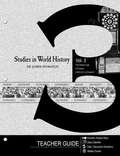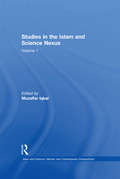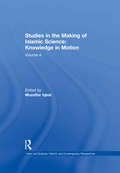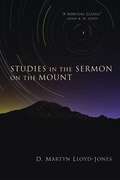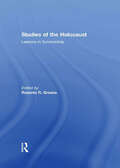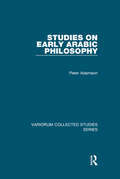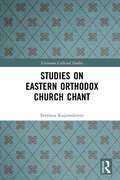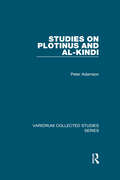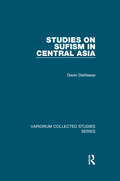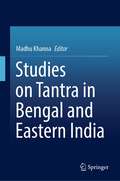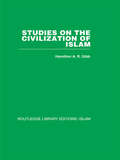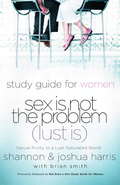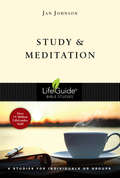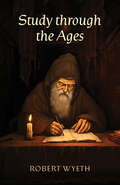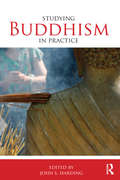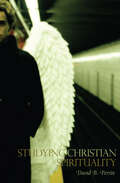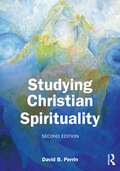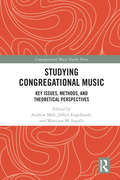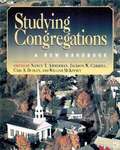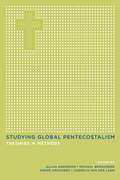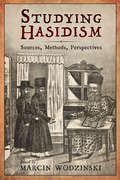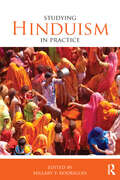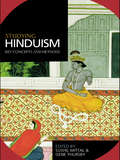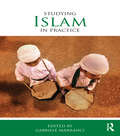- Table View
- List View
Studies in World History Volume 3 (Teacher Guide)
by James P. StobaughTeacher guides include insights, helps, and weekly exams, as well as answer keys to easily grade course materials! Help make your educational program better - use a convenient teacher guide to have tests, answer keys, and concepts! An essential addition for your coursework - team your student book with his convenient teacher guide filled with testing materials, chapter helps, and essential ways to extend the learning program.
Studies in the Islam and Science Nexus: Volume 1 (Islam and Science: Historic and Contemporary Perspectives)
by Muzaffar IqbalThis volume brings together thematically arranged articles on the relationship between Islam and science and how it has been shaped over the last century. The articles represent a broad variety of approaches and perspectives as well as reflective and analytic views and include some of the most important voices in the Islam and science discourse. This collection, which includes a special section devoted to studies that explore various aspects of the relationship between the Qur'an and science, is a valuable resource for researchers interested in gaining a greater understanding of the broader relationship between religion and science.
Studies in the Making of Islamic Science: Volume 4 (Islam and Science: Historic and Contemporary Perspectives)
by Muzaffar IqbalSituated between the Greek, Indian and Persian scientific traditions and modern science, the Islamic scientific tradition received, enriched, transformed and then bequeathed scientific knowledge to Europe. The articles selected for this volume explore the fascinating process of knowledge in motion between different civilizations.
Studies in the Sermon on the Mount
by D. Martyn Lloyd-JonesA spiritual classic, this detailed and comprehensive study by one of the greatest expository preachers of our time explains Christ's teaching in the Sermon on the Mount and incisively applies it to the Christian life.With characteristic vigor and emotional vitality Dr. Lloyd-Jones presents a brilliant and detailed exposition of one of the best known but most frequently misunderstood passages of Scripture. Here is a comprehensive and exhaustive study of our Lord's words as recorded in Matthew chapter five. This beautiful portion of the Sermon on the Mount is carefully analysed, its contents outlined and thoughtfully arranged, and vastly rich and abundant truths are gleaned for the reader's spiritual nurture.The author brought a wealth of devoted study as well as a profound spiritual appreciation to the work of interpreting this greatest address of our delightful experience in meditation. It presents depth of thought in simple language and beauty of style and contains a veritable thesaurus of spiritual truths drawn from the entire Bible.
Studies of the Holocaust: Lessons in Survivorship
by Roberta R. GreeneIt has been more than sixty years since the end of World War II and the liberation of the survivors of the Holocaust. Since then, many rich personal and historical accounts have been written of the horrific events of those times. Mental health workers have strived to give survivors solace for their loss, and help them return to a meaningful life. Meanwhile, scholars continue to ponder the inexplicable facts of genocide.Yet Studies of the Holocaust: Lessons in Survivorship continues to be timely. Based on more than 100 interviews in nine U.S. locations, the book offers a powerful view of survivors’ hope, determination, and resilience. Study questions elicited survival strategies, and revealed how, following the war, survivors overcame the horrors of the Holocaust, formed families, built careers, and gave to their communities. Survivor quotes taken from these interviews illuminate how the survivors maintained competence into old age. While memories of pain persist, accomplishments are acknowledged, and provide lessons for students of human development, mental health practitioners, and the general public. This book was previously published as a special issue of Journal of Human Behaviour and the Social Environment.
Studies of the Human Aura
by Kuthumi Mark L. ProphetDiscover new dimensions of yourself as Kuthumi unfolds the mysteries of aura - its colorations, how to read it, purify and protect it, and use it for spiritual healing.
Studies on Early Arabic Philosophy (Variorum Collected Studies #1054)
by Peter AdamsonPhilosophy in the Islamic world from the 9th to 11th centuries was characterized by an engagement with Greek philosophical works in Arabic translation. This volume collects papers on both the Greek philosophers in their new Arabic guise, and on reactions to the translation movement in the period leading up to Avicenna. In a first section, Adamson provides general studies of the ’formative’ period of philosophy in the Islamic world, discussing the Arabic reception of Aristotle and of his commentators. He also argues that this formative period was characterized not just by the use of Hellenic materials, but also by a productive exchange of ideas between Greek-inspired ’philosophy (falsafa)’ and Islamic theology (kalÄm). A second section considers the underappreciated philosophical impact of Galen, using Arabic sources to understand Galen himself, and exploring the thought of the doctor and philosopher al-RÄzÄ«, who drew on Galen as a chief inspiration. A third section looks at al-FÄrÄbÄ« and the so-called ’Baghdad school’ of the 10th century, examining their reaction to Aristotle’s Metaphysics, his epistemology, and his famous deterministic ’sea battle’ argument. A final group of papers is devoted to Avicenna’s philosophy, which marks the beginning of a new era of philosophy in the Islamic world.
Studies on Eastern Orthodox Church Chant (Variorum Collected Studies)
by Svetlana KujumdzievaThis book focuses on the compilation of the different practices of Eastern Orthodox Chant, looking at the subject through various languages, practices, and liturgical books and letters. The subject of this book is also analysed through newly found, unique material, to provide the entire history of Eastern Orthodox Chant, from the ninth to the nineteenth centuries and approached through a number of different disciplines. The book consists of sixteen topics, grouped in four parts: Studies on Genre, Studies on Liturgical Books, Studies on Distinguished Men of Letters, and Studies on Bulgarian Orthodox Church Chant. The aim of the book is to present the Eastern chant as a phase in the evolution of Mediterranean art, which is the cradle of Graeco-Roman heritage. This complex study brings in a variety of sources to show the purpose of Eastern Orthodox Chant as strengthening the Christian faith during the Middle Ages and the revival of Balkan nationalism in the nineteenth century. This book will appeal to students and scholars alike, interested in liturgical musical books, liturgy, and chant repertory. Likewise, it will be of interest to those engaged in medieval and early modern history, music, and culture.
Studies on Plotinus and al-Kindi
by Peter AdamsonThis book collects 15 papers on the greatest philosopher of late antiquity and founder of Neoplatonism, Plotinus (d.270), and the founding figure of philosophy in the Islamic world: al-KindÄ« (d. ca. 873). A number of the contributions focus on the text that joins the two: the so-called Theology of Aristotle, in fact an Arabic version of Plotinus’ Enneads produced in al- KindÄ«’s translation circle. Across several papers, Adamson argues that this translation is best understood as a reinterpretation of Plotinus designed to appeal to contemporary readers in the culture of the ’AbbÄsid era. Two contributions also analyze the notes on the Theology written by the great Avicenna. Other papers look at aspects of al-KindÄ«’s own thought, exploring his ideas concerning metaphysics, free will astrology, and optics. The traditions of Plotinus and al-KindÄ« are also treated, with papers on Plotinus’ student Porphyry and his Arabic reception, and on followers of al-KindÄ«. Adamson argues that we can identify what he calls a 'Kindian tradition' in the 9th-10th centuries. He discusses the philosophical presuppositions of this movement, and the use of al-KindÄ«’s ideas made by one particular representative of the Kindian tradition, the Persian thinker Miskawayh.
Studies on Sufism in Central Asia: New Perspectives On Sufi Traditions, 15th-21st Centuries (Variorum Collected Studies #1017)
by Devin DeWeeseStudies on Sufism in Central Asia reproduces 12 studies which explore previously unstudied sources with an eye to identifying prominent developments in the social and organizational history of the major Sufi groupings of the region; The chronological range reflected in the studies included here runs from the 13th century to the 17th, with a somewhat uneven distribution between the earlier half of the period (13th-15th centuries, with six articles, Nos. II, IV, V, VII, VIII, and XI) and the later half (16th-17th centuries, with four pieces, Nos. III, IX, X, XII), and two studies (Nos. I and VI) spanning the entire period. In terms of specific Sufi traditions, the studies included here reflect DeWeese’s attention to groups and individuals that might be identified (despite the focus of some of his more recent work on questioning the use and meaning of such labels) as KubravÄ«, YasavÄ«, and KhwÄjagÄnÄ«/NaqshbandÄ«, with four studies focused entirely on ’KubravÄ«’ circles (Nos. I, II, V, XI), five on ’YasavÄ«’ subjects (Nos. III, VII, IX, X, XII), and one on the KhwÄjagÄn (No. VIII), as well as one dealing with YasavÄ«-NaqshbandÄ« relations (No. VI) and another exploring a group that falls outside these labels (No. IV). KhwÄjagÄnÄ« and NaqshbandÄ« history has a strong ’background’ presence, nevertheless, in five other articles (Nos. I, III, IV, VII, and IX), reflecting the steady rise of the NaqshbandÄ«ya to predominance among Central Asian Sufi traditions.
Studies on Tantra in Bengal and Eastern India
by Madhu KhannaThis book explores the tantric concept of Shakti, or the principal female cosmic entity and her pilgrimage sites. It offers a first-hand view of the multidimensional ways in which Shakti asserted its supremacy over existing Vaishnava and orthodox Brahmanical traditions in post mediaeval Bengal and India. The interdisciplinary chapters pave the way to understanding the intra-textual relationships between philosophical and conceptual ideas in literary texts and their oral transmission. Divided into three thematic sections: Cult Inclusiveness, Śakti Pithas, and the Śākta Philosophy, the book invites readers to explore a contested area of scholarship from unique perspectives, offering rich insights into the nature of negotiations between diverse religious streams. It also urges readers to examine the many innovative approaches and theoretical models on the goddess culture of East India. The book is of interest to students and scholars of religious textual studies, anthropology, pilgrimage studies, comparative religion, Sanskrit and Bengali languages, regional studies, South Asian cultures, goddess traditions and cultural history of mediaeval Bengal.
Studies on the Civilization of Islam (Princeton Legacy Library #685)
by H.A.R. GibbOriginally published in 1962, this book presents important studies on the history, literature and religion of the Islamic peoples as well as an appraisal of contemporary intellectual currents in the Middle East. Part I interprets the basic political and cultural development in medieval Islam, set in the context of its growth from a religious movement in the Arabian peninsula to an imperial structure extending from the Atlantic Ocean to the borders of China. Part II includes studies of Islamic institutions, philosophy and religion. The close relationship of Islam to Western traditions through the Biblical and Greek heritages is emphasized and the factors which have moulded unique and distinctive institutions are considered.
Study Guide for Women Sex is not the Problem (Lust is): Sexual Purity in a Lust Saturated World - A Study Guide
by Joshua Harris Shannon HarrisCelebrate Purity Overcoming lust is a process that requires diligent focus and accountability from others, and these in-depth guides help establish both. They're designed for a variety of settings, from one-on-one accountability partnerships to Sunday school classes. Sex Is Not the Problem (Lust Is)made the statement that lust is a human problem (not just a guy problem) and that Jesus can free anyone from its power. Going further, these gender-specific study guides feature questions and discussion starters that directly address the temptations unique to men and women. These resources are a must-have for anyone challenged to defeat lust and celebrate purity in their lives. Experience Victory Along the Journey to Holiness Based on his bestselling message inSex Is Not the Problem (Lust Is), Joshua Harris offers a companion study guide specifically designed to address the issues men face. Versatile in nature, this study guide can be used in one-on-one accountability or in a church group setting. " Joshua Harris has done it again. Sex Is Not the Problem (Lust Is)contains the undiluted biblical truth on a vital topic, served up with honesty and humility. " -C. J. Mahaney Author ofThe Cross Centered Life Sidebar: Each of the ten small-group sessions includes: Easy Review: A quick chapter summary makes review simple. Discussion Questions: Questions that serve as icebreakers, and then lead to deeper discussion and personal application. Accountability Follow-Up: Questions to help check each other's progress in a truthful and caring setting. Meditate and Memorize: Key Scriptures that will help men gain victory over lust. Custom-Tailored Action Plan: Men will be led in a step-by-step formulation of an Action Plan, uniquely tailored to combat their specific battles. Story Behind the Book "I was preparing a message on lust when I realized that the book I wanted to consult hadn't been written. That book would make it clear that only Jesus Christ can free us from the hopeless treadmill of shame and guilt that so many well-intentioned people end up on. It would instill a love for holiness and a hatred for sin without dragging the reader's imagination through the gutter. And it would be for both men and women, because I've learned that lust isn't just a guy problem-it's a human problem. " -Joshua Harris
Study and Meditation (LifeGuide® Bible Studies)
by Jan JohnsonReading the Bible is one of the most important spiritual disciplines we can engage in. Why is Bible study so significant? How can our attitude and approach affect what we get out of our reading? The way we approach the Bible affects our interaction with God. Learning to immerse ourselves in God's thoughts through study and meditation allows us to go deeper into God's Word and live in a more Christlike way. This six-session LifeGuide from Jan Johnson helps us do just that. For over three decades LifeGuide Bible Studies have provided solid biblical content and raised thought-provoking questions—making for a one-of-a-kind Bible study experience for individuals and groups. This series has more than 130 titles on Old and New Testament books, character studies, and topical studies.
Study through the Ages
by Robert WyethAll the authors of the Bible had their way of writing down what they thought, the place where they lived, the current ideas, the situation of the times and the concept of what they were expecting to happen. The words they used over many centuries were left to God to find a way, a script which eventually led to the 66 books of the Old and New Testament. We find similarities of thought and pattern stretching over the whole Bible that tell us what the Lord would have us think and do. It’s like ‘God’s Manual for Living’. This is one book, the Bible, that explains the truth, not one section or book that we can do without studying. It is primarily based on words. It is true from Genesis to Revelation that we must search and find the way to live, and the book contains the truth.
Studying Buddhism in Practice
by John S. HardingThis book introduces the rich realities of the Buddhist tradition and the academic approaches through which they are studied. Based on personal experiences of Buddhism on the ground, it provides a reflective context within which religious practices can be understood and appreciated. The engaging narratives cover a broad range of Buddhist countries and traditions, drawing on fieldwork to explore topics such as ordination, pilgrimage, funerals, gender roles, and film-making. All the entries provide valuable contextual discussion and are accompanied by photographs and suggestions for further reading.
Studying Christian Spirituality
by David B. PerrinThis book provides a new introduction to the study of Christian spirituality, exploring it through the human sciences and ranging from philosophy and hermeneutics to psychology, history, sociology and anthropology. Systematic and progressive, it introduces the key approaches and shows how they relate to the understanding, study and practice of spirituality. Covering a vast amount of ground - from traditional themes such as images of God, spiritual direction and pilgrimage to more contemporary issues, such as place and space, cyberspace and postcolonialism - the author takes an ecumenical, inclusive stance, allowing the book to be used in a wide variety of courses and across denominations.
Studying Christian Spirituality
by David B. PerrinStudying Christian Spirituality proposes a framework to discover how spirituality can be understood beyond the conventional boundaries that religions have established.Its nine chapters discuss a wide variety of issues and questions, which include: definitions of spirituality; the impact of models of God; human-spiritual development; the importance of context; historical criticism; anthropology; interpretation of texts and art; and examples of spiritual practice. David B. Perrin clearly explains the traditional relationships between Christian spirituality and theology and history. He also proposes greater connections with the human sciences, such as philosophy, psychology, phenomenology, and sociology, and reshapes the classical approaches to Christian spirituality, its texts, practices, and experience.This interdisciplinary volume is an essential reference for scholars and students at all levels who desire to develop a deeper understanding of Christian spirituality’s research methods, and its relevance to the world today.
Studying Congregational Music: Key Issues, Methods, and Theoretical Perspectives (Congregational Music Studies Series)
by Monique M. Ingalls Jeffers Engelhardt Andrew MallStudying the role of music within religious congregations has become an increasingly complex exercise. The significant variations in musical style and content between different congregations require an interdisciplinary methodology that enables an accurate analysis, while also allowing for nuance in interpretation. This book is the first to help scholars think through the complexities of interdisciplinary research on congregational music-making by critically examining the theories and methods used by leading scholars in the field. An international and interdisciplinary panel of contributors introduce readers to a variety of research methodologies within the emerging field of Congregational Music Studies. Utilising insights from fields such as communications studies, ethnomusicology, history, liturgical studies, popular music studies, religious studies, and theology, they examine and model methodologies and theoretical perspectives that are grounded in each of these disciplines. In addition, this volume presents several "key issues" to ground these interpretive frameworks in the context of congregational music studies. These include topics like diaspora, ethics, gender, and migration. This book is a new milestone in the study of music amongst congregations, detailing the very latest in best academic practice. As such, it will be of great use to scholars of religious studies, music, and theology, as well as anyone engaging in ethnomusicological studies more generally.
Studying Congregations: A New Handbook
by Nancy T. AmmermanThis handbook for seminarians and clergy professionals places the congregation itself, rather than individual scholarly disciplines, at the center of congregational analysis. Using a comprehensive systems approach to congregations, this volume enables readers to analyze the ministries, stories, and processes that are at work in congregations. It provides techniques for studying the congregation as well as a framework for understanding the nature of the congregation.
Studying Global Pentecostalism
by Allan AndersonWith its remarkable ability to adapt to many different cultures, Pentecostalism has become the world's fastest growing religious movement. More than five hundred million adherents worldwide have reshaped Christianity itself. Yet some fundamental questions in the study of global Pentecostalism, and even in what we call "Pentecostalism," remain largely unaddressed. Bringing together leading scholars in the social sciences, history, and theology, this unique volume explores these questions for this rapidly growing, multidisciplinary field of study. A valuable resource for anyone studying new forms of Christianity, it offers insights and guidance on both theoretical and methodological issues. The first section of the book examines such topics as definitions, essentialism, postcolonialism, gender, conversion, and globalization. The second section features contributions from those working in psychology, anthropology, sociology, and history. The third section traces the boundaries of theology from the perspectives of pneumatology, ecumenical studies, inter-religious relations, and empirical theology.
Studying Hasidism: Sources, Methods, Perspectives
by Galit Hasan-Rokem Edwin Seroussi Yohanan Petrovsky-Shtern Shaul Magid David Assaf Maya Balakirsky Katz Uriel Gellman Gadi Sagiv Levi Cooper Vladimir LevinHasidism, a Jewish religious movement that originated in Poland in the eighteenth century, today counts over 700,000 adherents, primarily in the U.S., Israel, and the UK. Popular and scholarly interest in Hasidic Judaism and Hasidic Jews is growing, but there is no textbook dedicated to research methods in the field, nor sources for the history of Hasidism have been properly recognized. Studying Hasidism, edited by Marcin Wodzinski, an internationally recognized historian of Hasidism, aims to remedy this gap. The work’s thirteen chapters each draws upon a set of different sources, many of them previously untapped, including folklore, music, big data, and material culture to demonstrate what is still to be achieved in the study of Hasidism. Ultimately, this textbook presents research methods that can decentralize the role community leaders play in the current literature and reclaim the everyday lives of Hasidic Jews.
Studying Hinduism in Practice (Studying Religions in Practice)
by Hillary P. RodriguesDrawing on personal experiences of Hinduism on the ground, this book provides a reflective context within which religious practices can be understood and appreciated. It conveys the rich realities of the Hindu tradition and the academic approaches through which they are studied. The chapters cover a wide range of topics, including dance, music, performance, festival traditions, temples, myth, philosophy, women’s practices, and divine possession. The engaging narratives are accompanied by contextual discussions and advice on such topics as conducting fieldwork, colonialism, Hindu seasonal celebrations, understanding deities, and aesthetics in Hinduism. All the entries are accompanied by photographs and suggestions for further reading.
Studying Hinduism: Key Concepts and Methods
by Sushil Mittal Gene ThursbyThis book is an indispensable resource for students and researchers wishing to develop a deeper understanding of one of the world's oldest and most multifaceted religious traditions. Sushil Mittal and Gene Thursby, leading scholars in the field, have brought together a rich variety of perspectives which reflect the current lively state of the field. Studying Hinduism is the result of cooperative work by accomplished specialists in several fields that include anthropology, art, comparative literature, history, philosophy, religious studies, and sociology. Through these complementary and exciting approaches, students will gain a greater understanding of India's culture and traditions, to which Hinduism is integral. The book uses key critical terms and topics as points of entry into the subject, revealing that although Hinduism can be interpreted in sharply contrasting ways and set in widely varying contexts, it is endlessly fascinating and intriguing.
Studying Islam in Practice (Studying Religions in Practice)
by Gabriele MarranciThis book presents Islam as a lived religion through observation and discussion of how Muslims from a variety of countries, traditions and views practice their religion. It conveys the experiences of researchers from different disciplinary backgrounds and demonstrates the dynamic and heterogeneous world of Islam. The fascinating case studies range from Turkey, Egypt, Morocco and Lebanon to the UK, USA, Australia and Indonesia, and cover topics such as music, art, education, law, gender and sexuality. Together they will help students understand how research into religious practice is carried out, and what issues and challenges arise.
